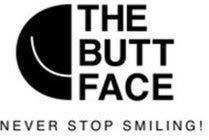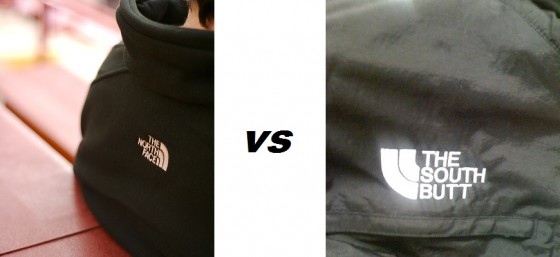The North Face Apparel Corp. is well-known for their outdoor apparel. When I lived in Oregon, I became quite familiar with their brand. Their tagline is “Never Stop Exploring.” In 2010, The North Face sued The South Butt, LLC for trademark infringement when the company started selling apparel with a similar name, logo, and tagline. The South Butt’s logo uses a similar font as The North Face and incorporates a set of curved lines, similar to The North Face’s log. The South Butt’s tagline was “Never Stop Relaxing.” The South Butt even tried to sell the brand to The North Face for $1 million. When I first saw a South Butt shirt, I thought it was hilarious and I knew it was a parody of The North Face, but I figured it wouldn’t last long on the market.
The two companies settled this dispute with an injunction that prohibited The South Butt from using The North Face’s trademarks or any mark that was similar to The North Face’s without permission. The trademark laws generally prohibit you from unfairly riding another brand’s coattails for your own benefit, confusing consumers about what the quality and source of the good they’re buying, or otherwise damaging another brand’s reputation with your trademark.
 Fast-forward to the summer of 2012, The North Face is back in court asking a judge to hold the owners of The South Butt in contempt. According to the report, the owners of The South Butt started a new company, Why Climb Mountains, LLC, and they are selling apparel under the brand “The Butt Face” with the tagline “Never Stop Smiling.” The logo also features curved lines which are similar to The North Face’s logo.
Fast-forward to the summer of 2012, The North Face is back in court asking a judge to hold the owners of The South Butt in contempt. According to the report, the owners of The South Butt started a new company, Why Climb Mountains, LLC, and they are selling apparel under the brand “The Butt Face” with the tagline “Never Stop Smiling.” The logo also features curved lines which are similar to The North Face’s logo.
The North Face is claiming that The South Butt owners are violating the injunction with this new line of apparel. They commissioned a survey that found that 35% of respondents associated The Butt Face logo with The North Face brand. The judge is expected to decide whether The South Butt owners violated the injunction that prohibited them from using a trademark that’s similar to The North Face.
I understand why a company would want to create a parody of an existing company’s brand, but this story makes me wonder, “Why would you do it twice to the same company if you ended up in court the first time around?” On the flip side, this story shows that there is a market for parody brands which, if a company was looking to expand its market, that would be one option to consider.
If you’re considering using a trademark that might be confused with your competitors’, please consult a trademark attorney in your community before you invest too much time and energy into creating that brand.
If you want to hear more of my thoughts on this topic, or if you think this post is too long to read, I made a video.
Feel free to connect with me via Twitter, Google+, Facebook, and LinkedIn, or you can email me.
Please visit my homepage for more information about Carter Law Firm.
Hat tip: JD Supra
